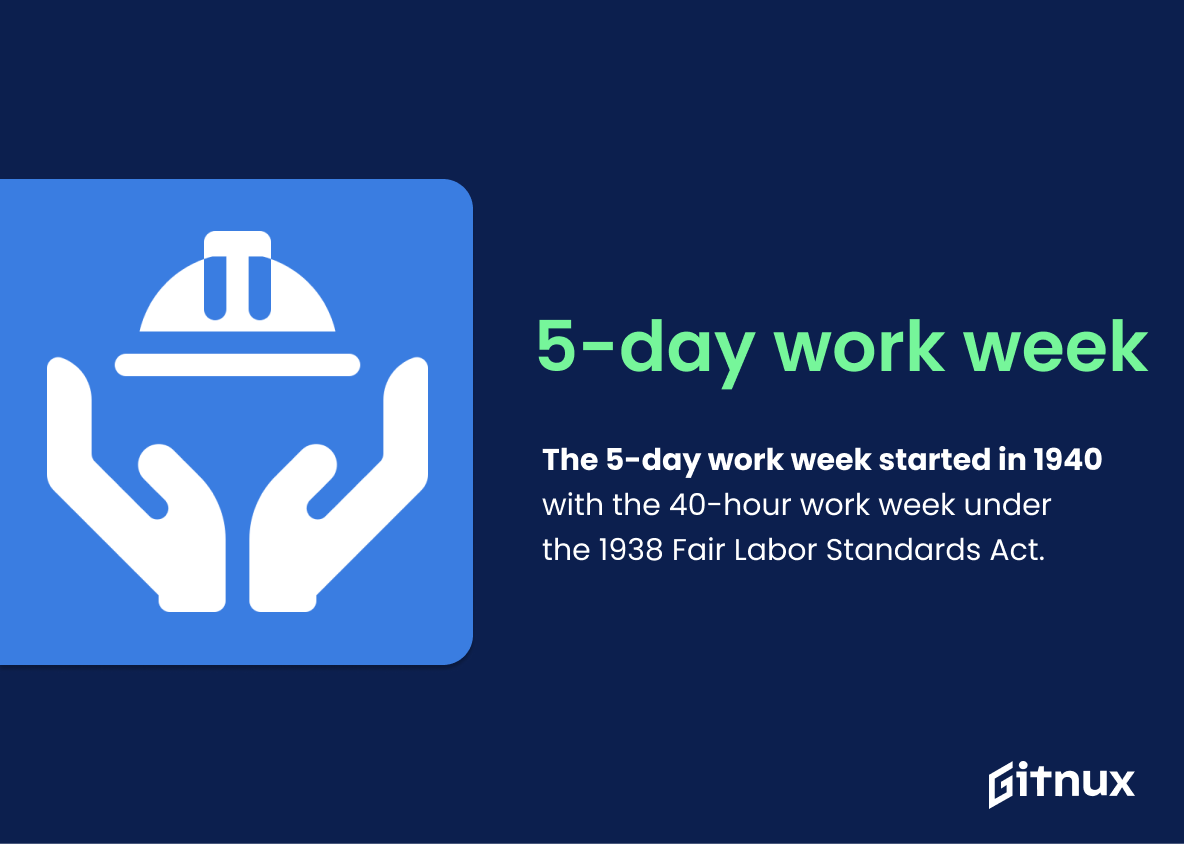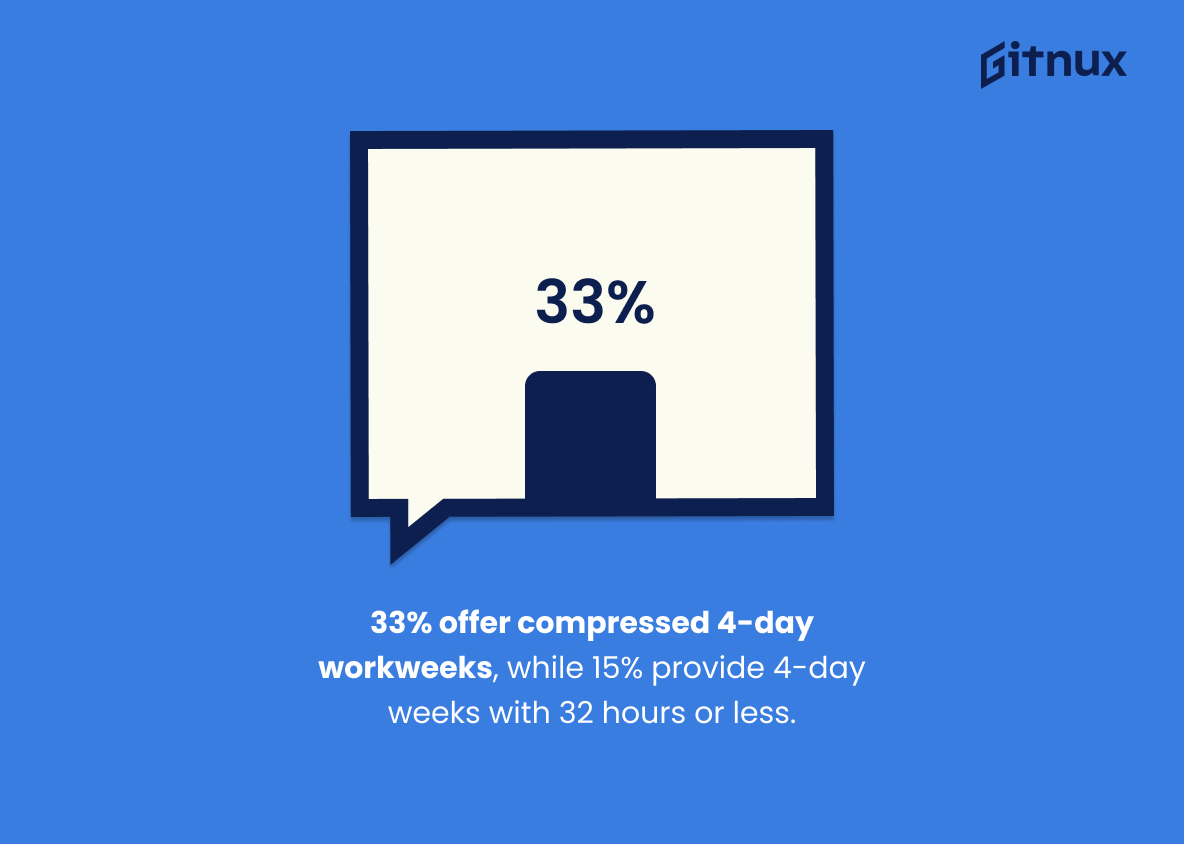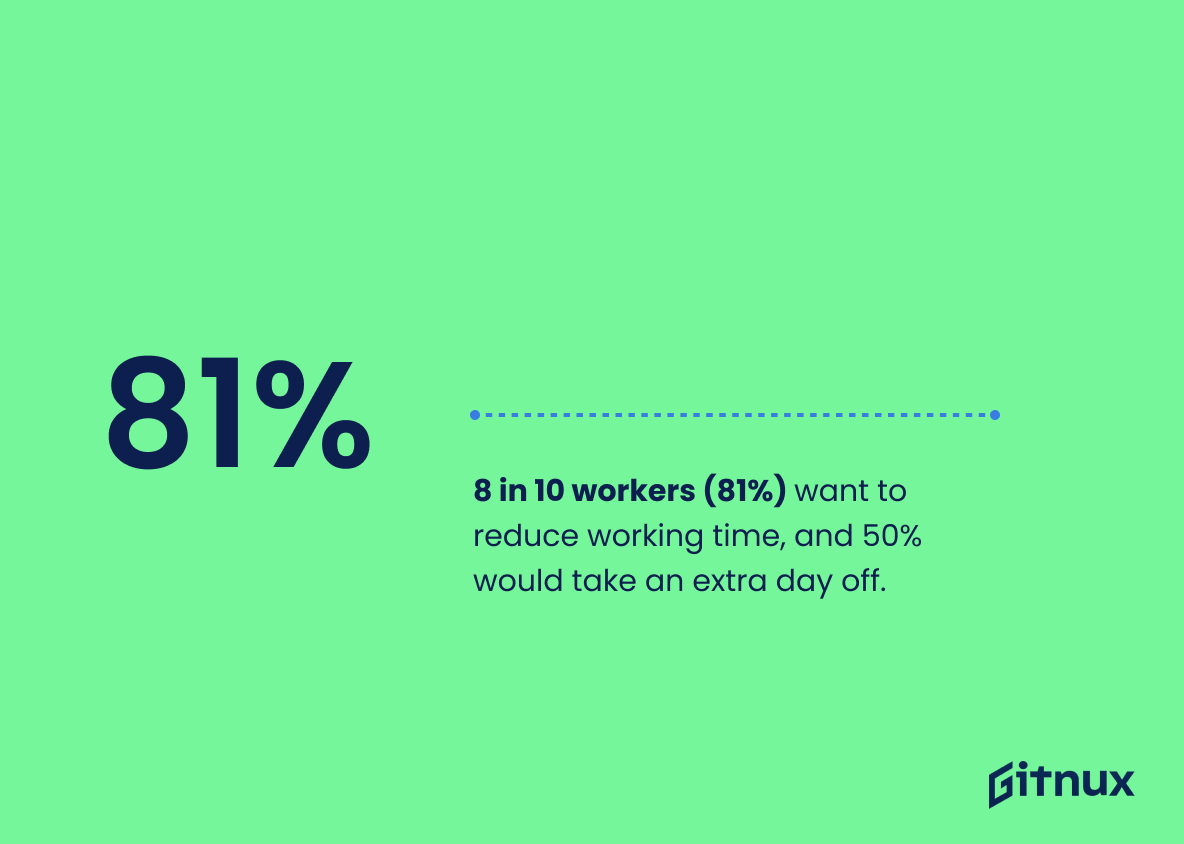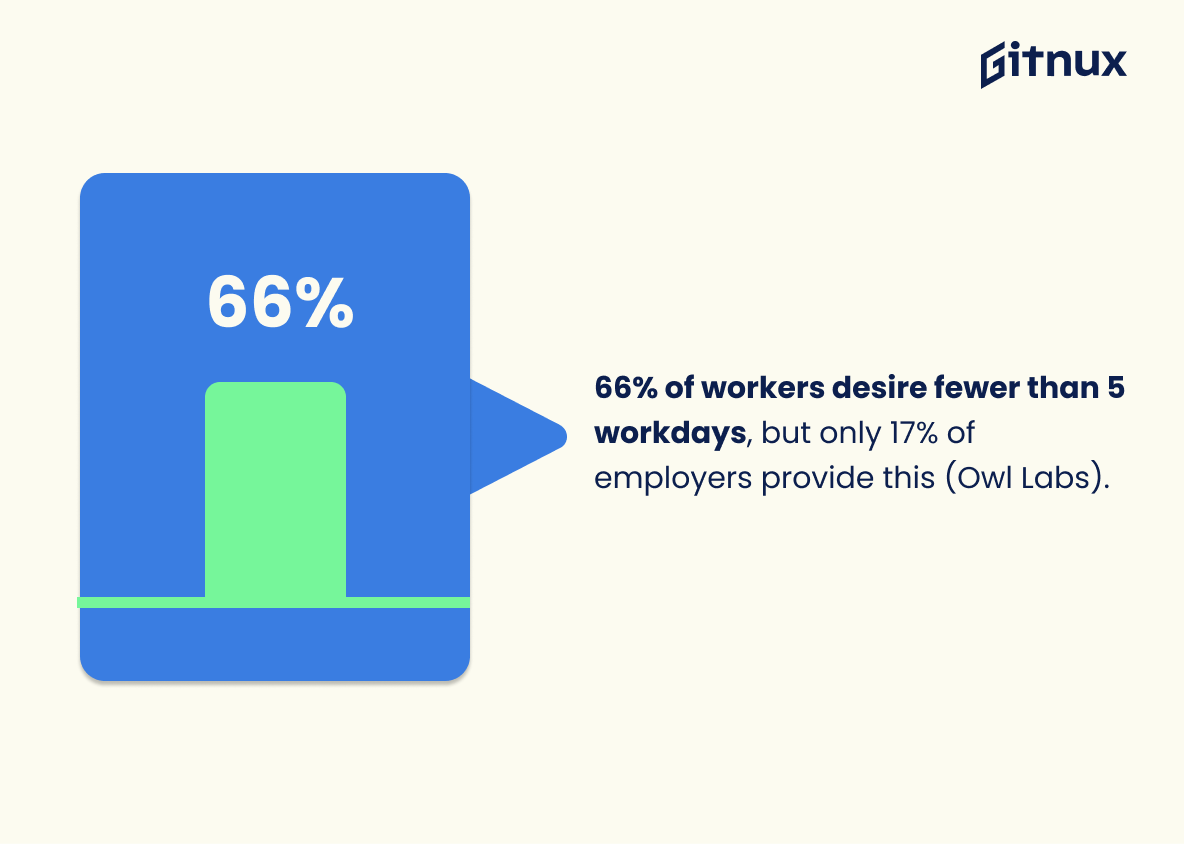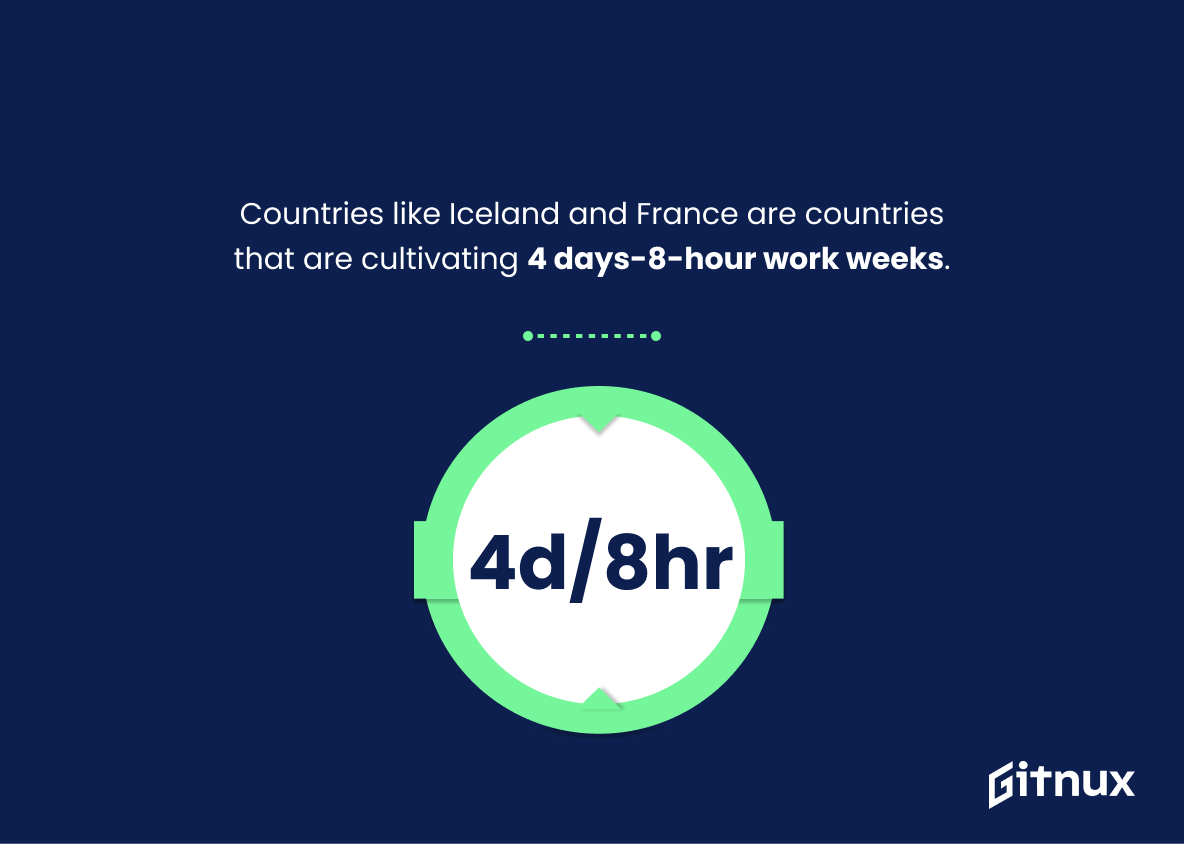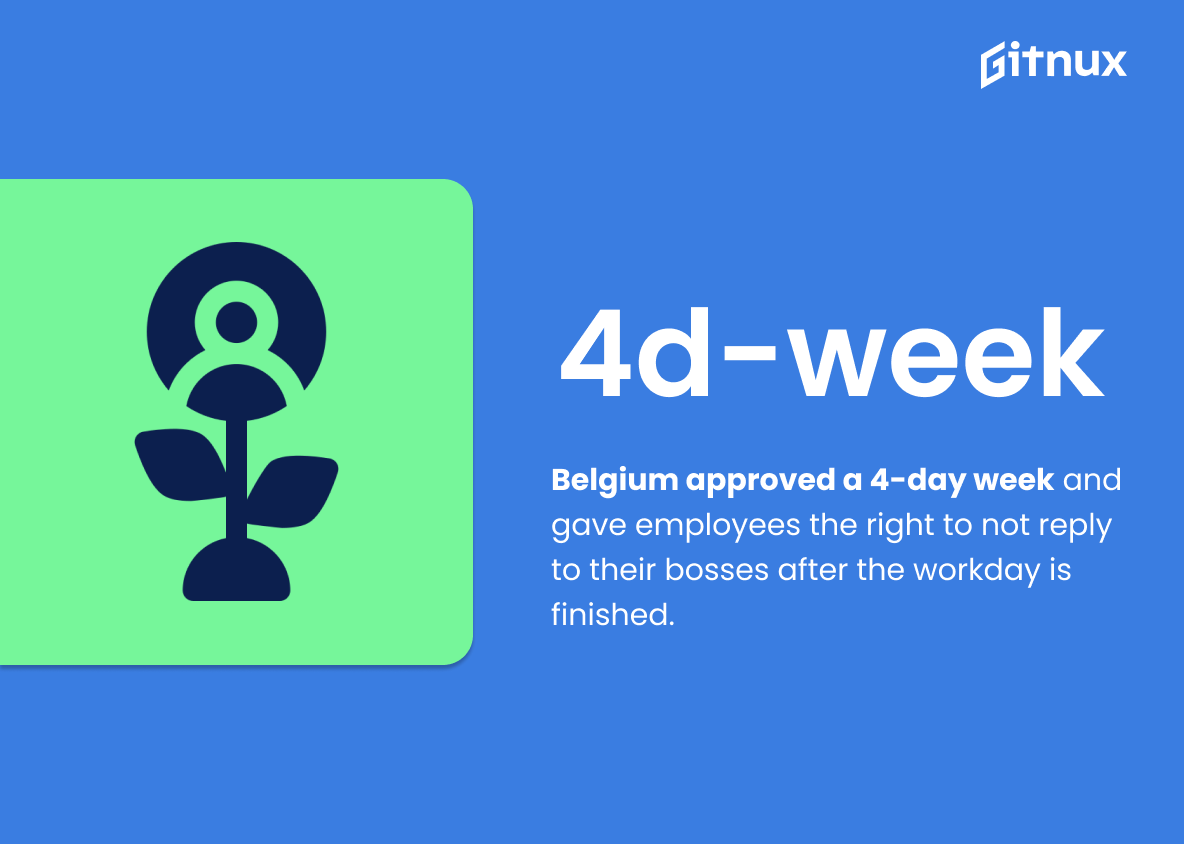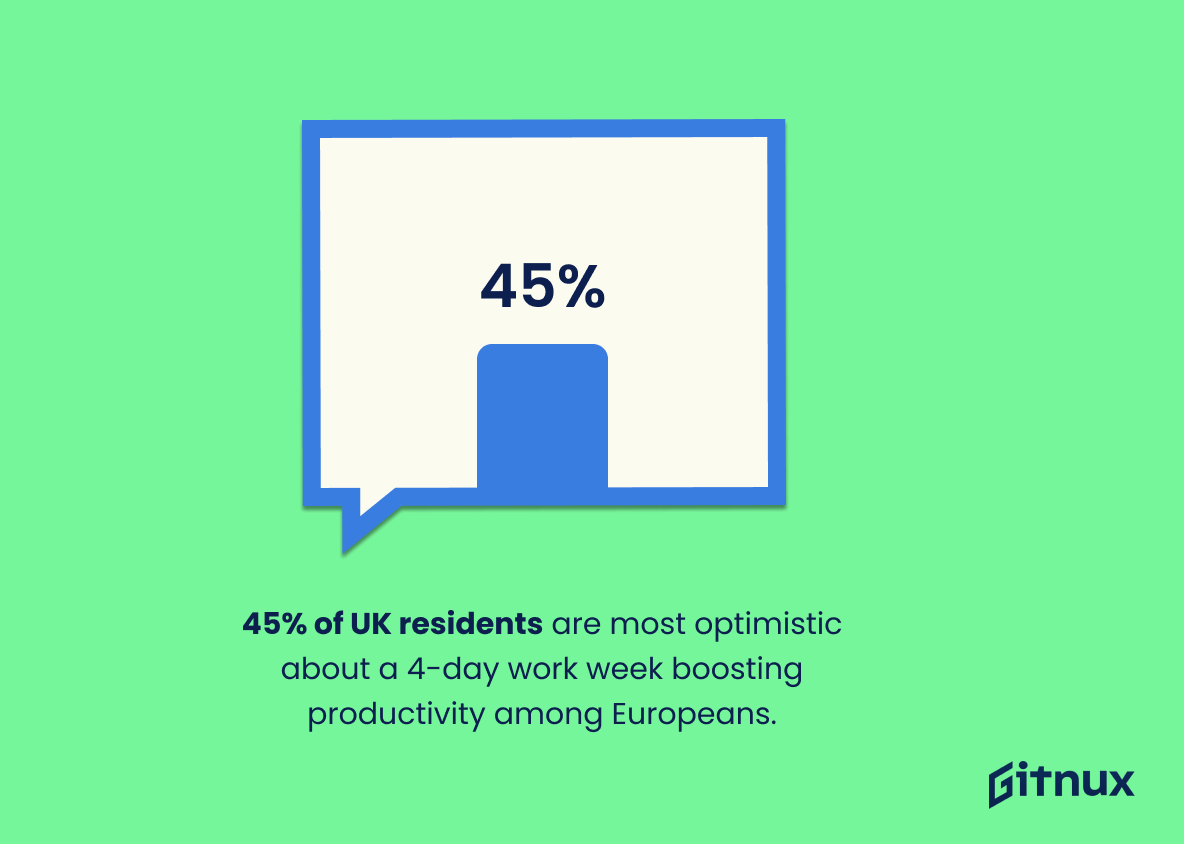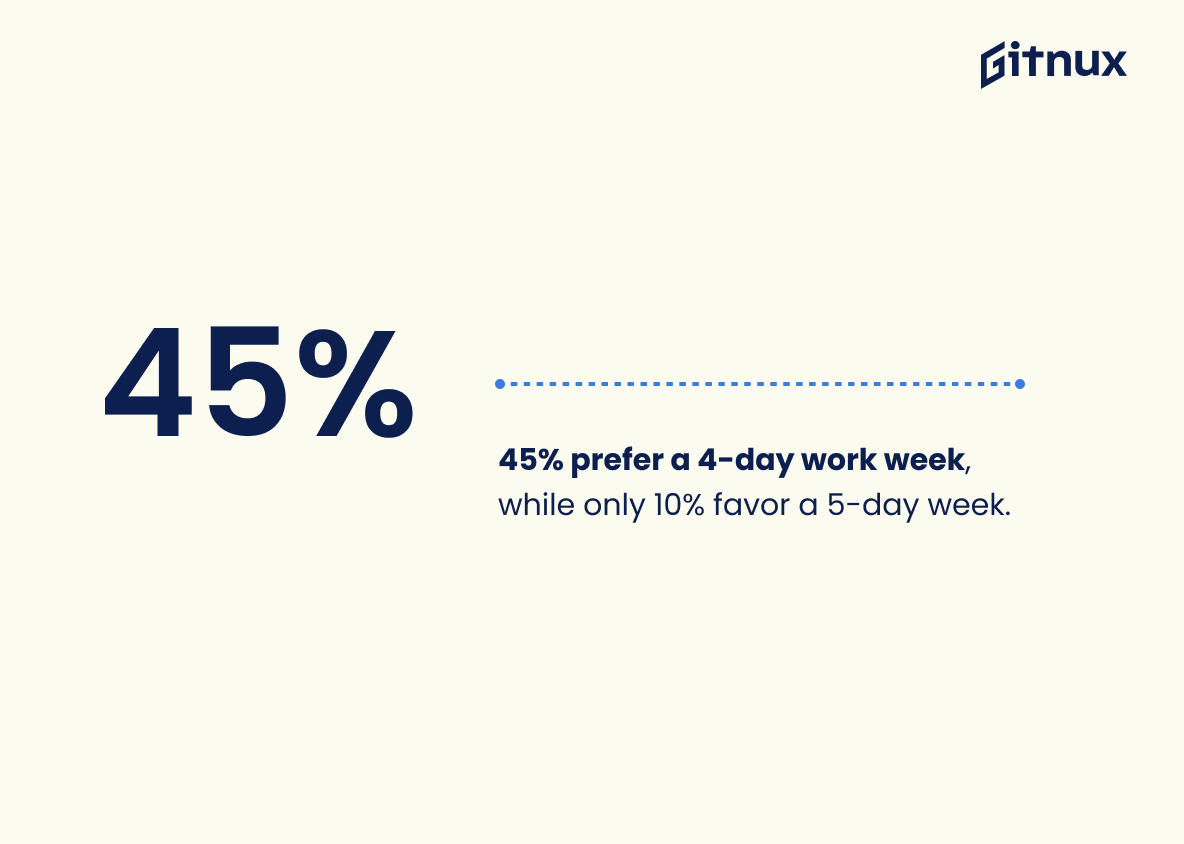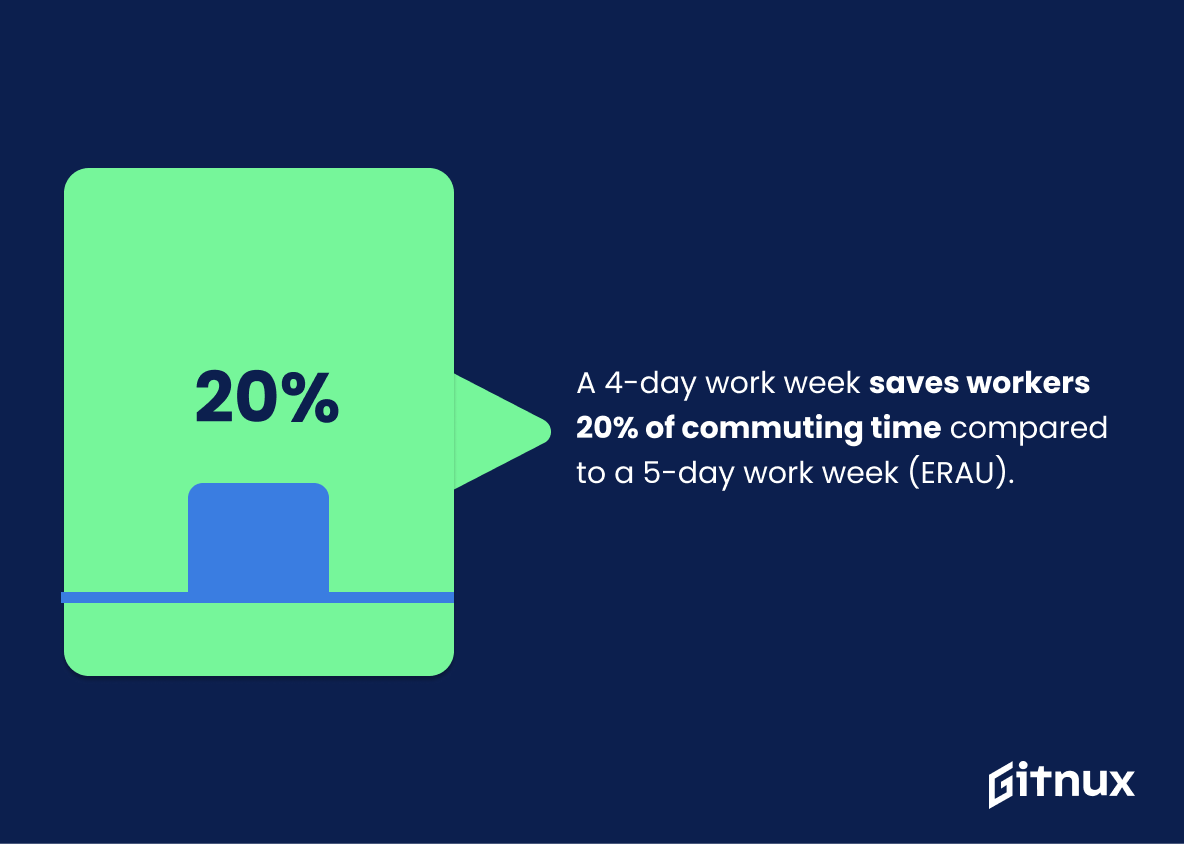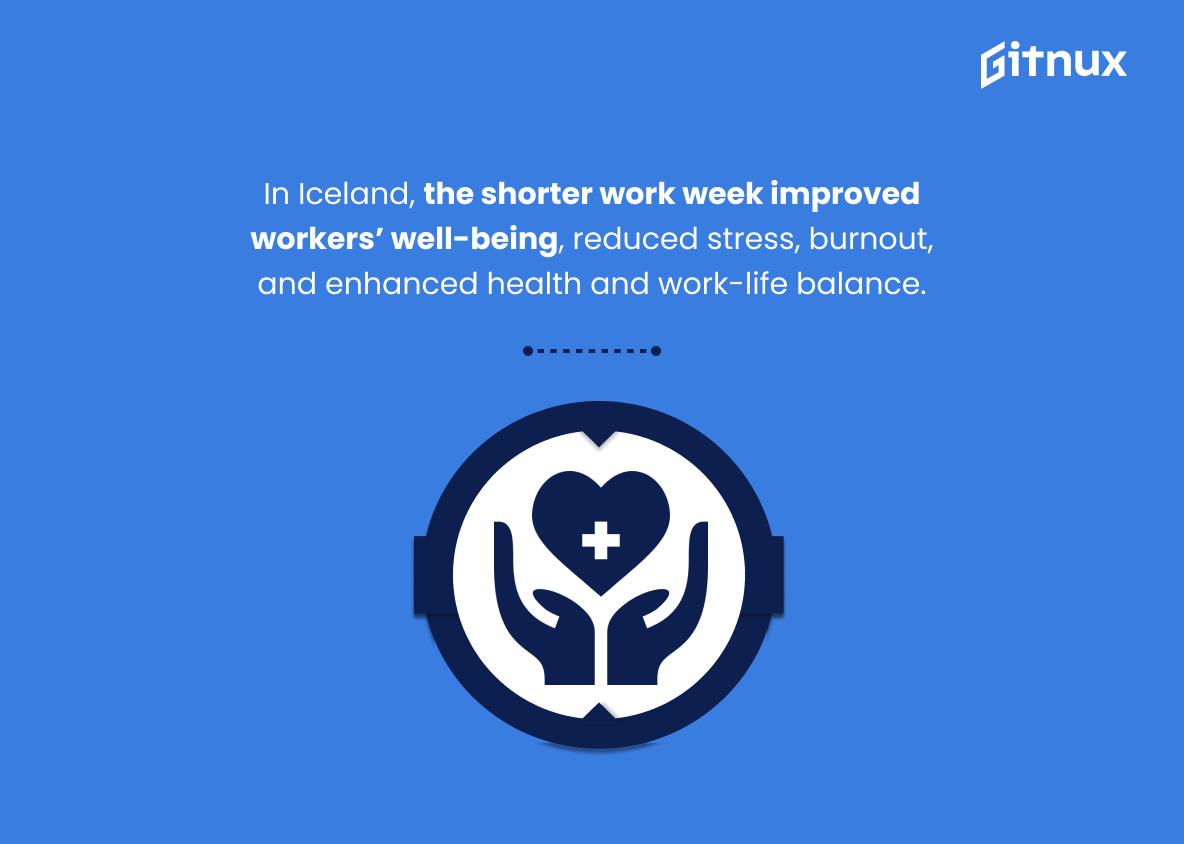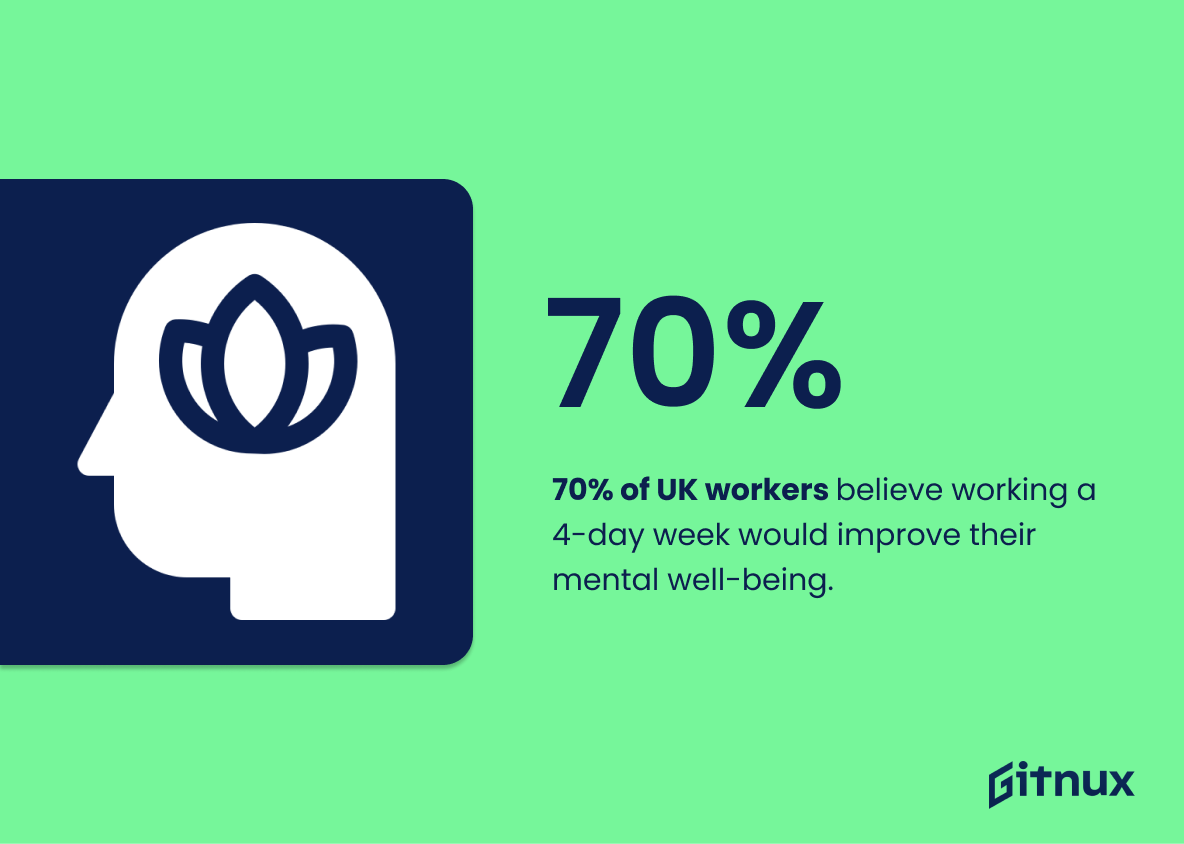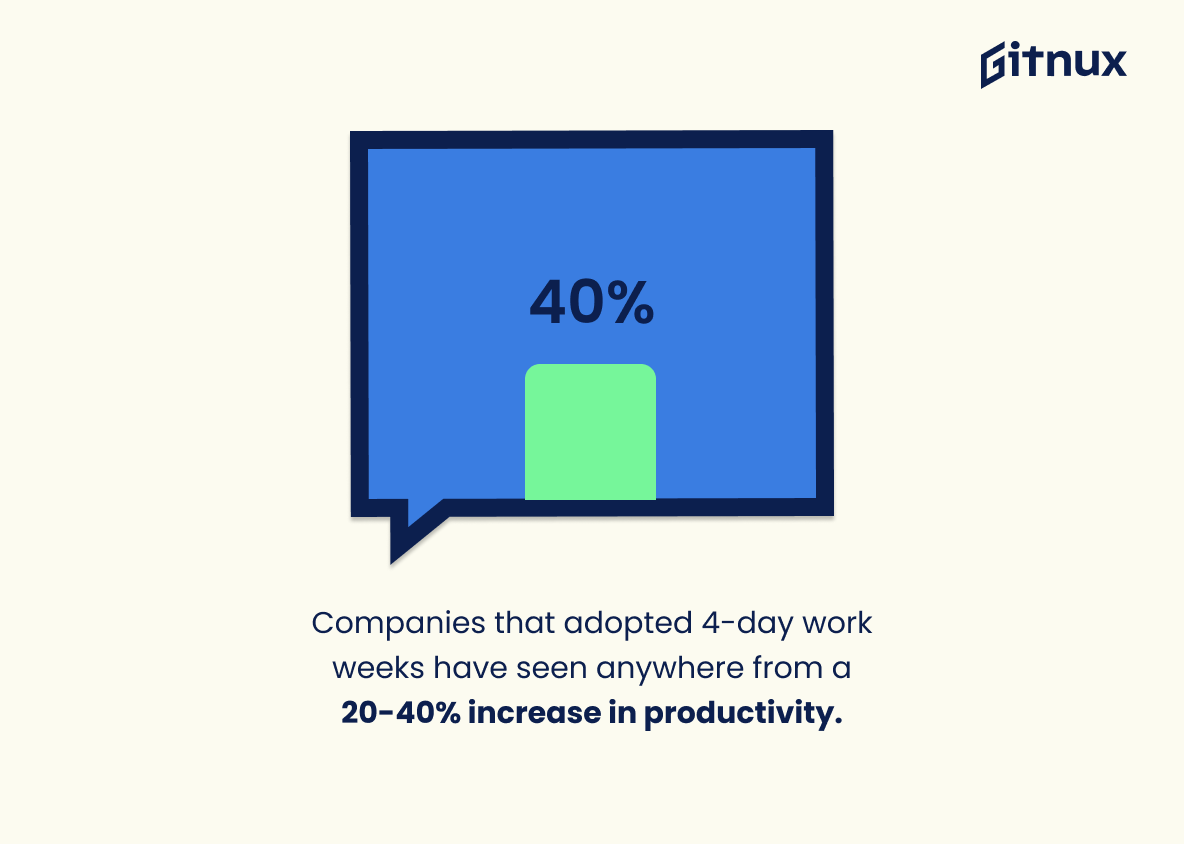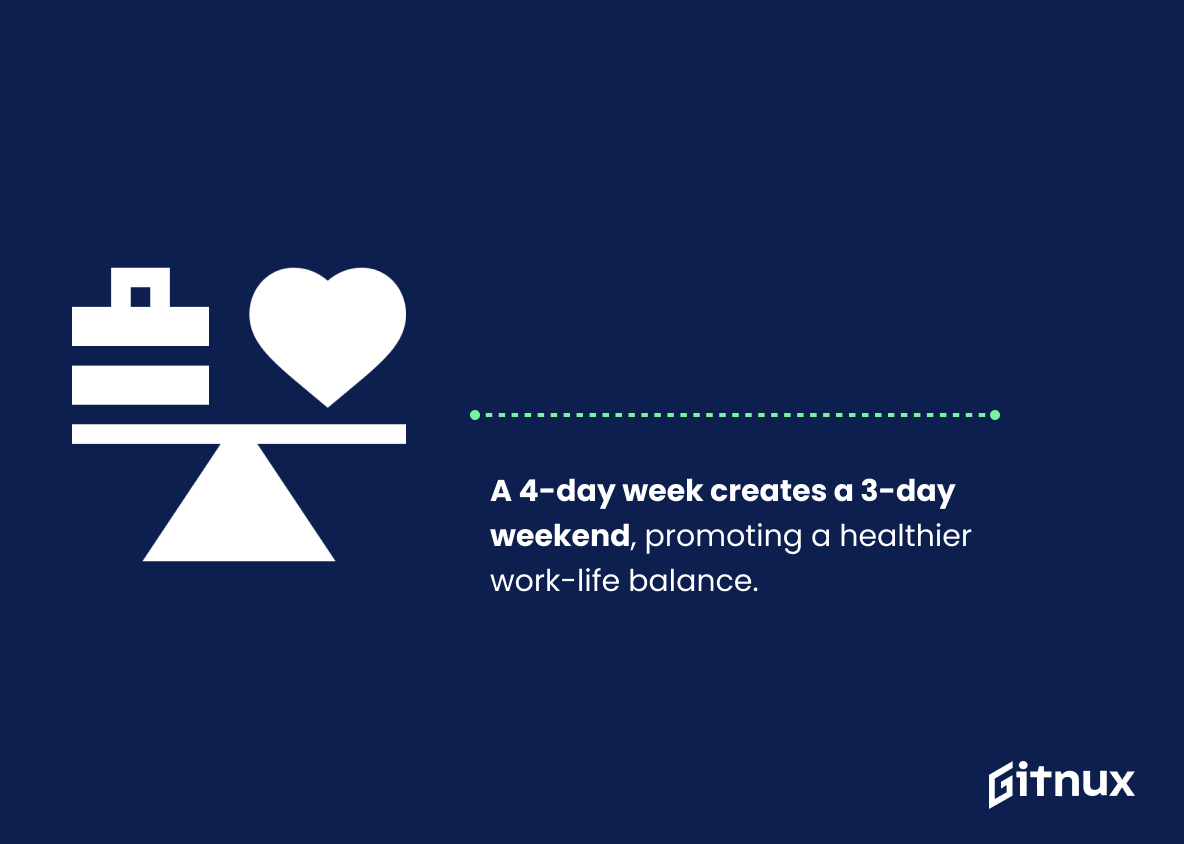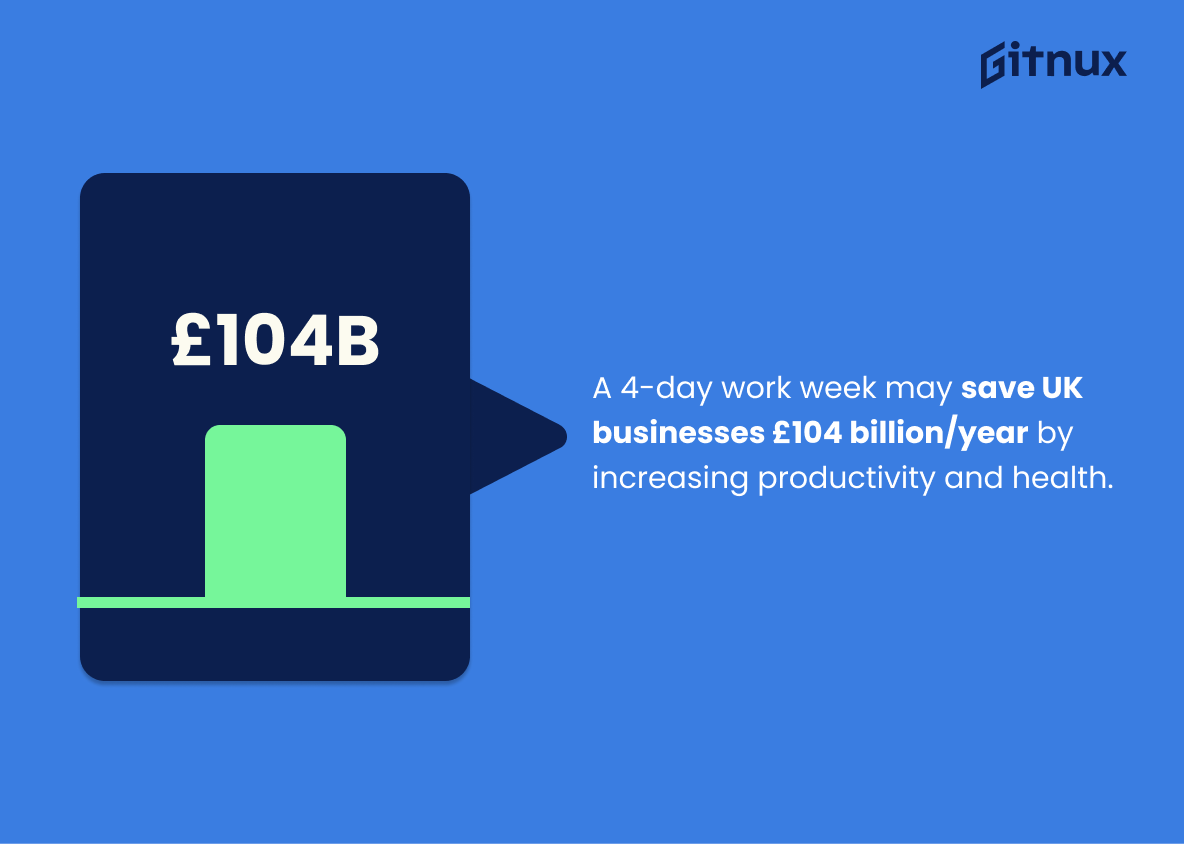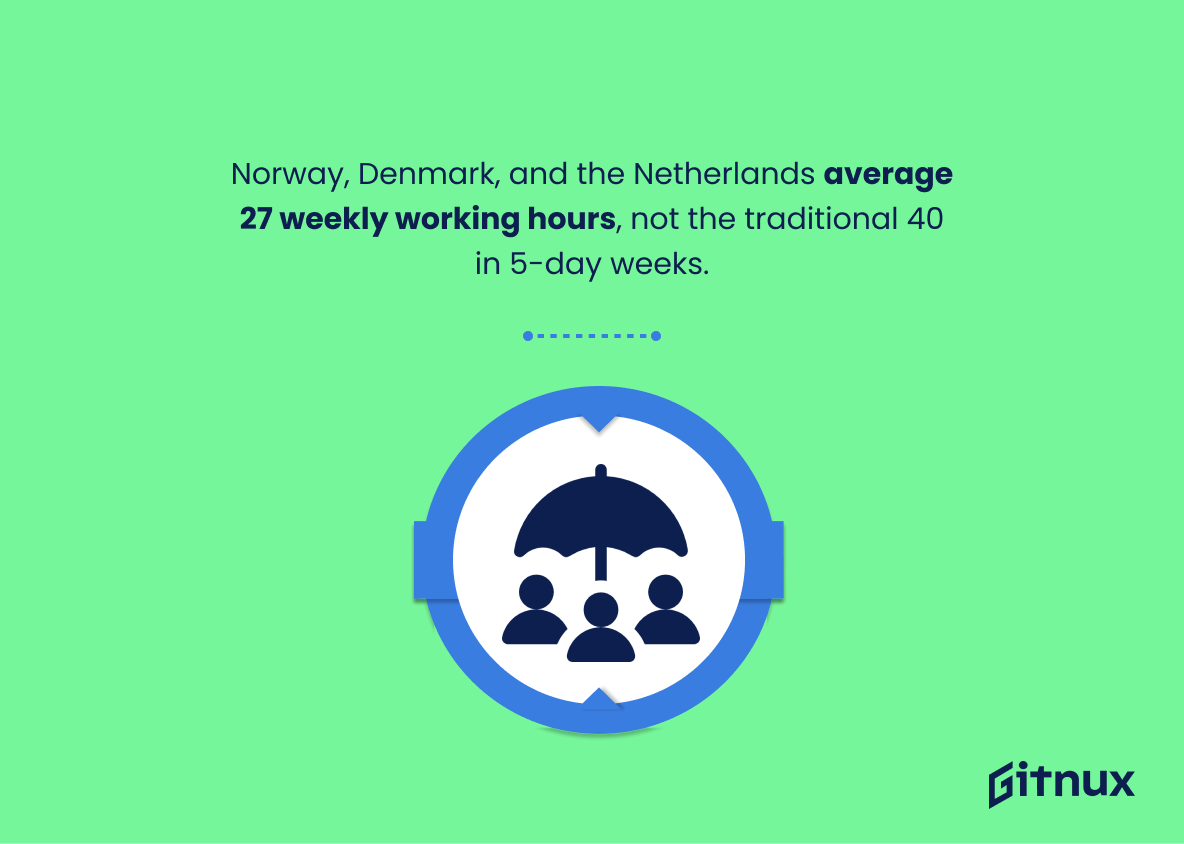The idea of a 4-day work week has been gaining traction in recent years, as more and more businesses look to increase employee satisfaction and productivity. But is it really worth it? What do the statistics say?
In this article, we will take a look at the 4-day work week statistics and trends to see how 4-day work weeks stack up against traditional 5-day work weeks. We will look at the potential benefits and drawbacks, and see if there’s evidence to suggest that a 4-day work week could be the way of the future.
4-Day Work Week: The Most Important Statistics
Companies that adopted 4-day work weeks have seen anywhere from a 20-40% increase in productivity.
Nearly half (46%) of large business leaders agree that making the switch to a 4-day working week will be important for future business success.
General 4-day work week statistics
The 5-day work week as we know it began in 1940, when the US 1938 Fair Labor Standards Act imposed a 40-hour work week. Since then not much has changed.
According to 70% of US workers, the 40-hour 5-day work week is outdated. Many workers feel they could get their work done in less than the typical time allotted.
Compressed workweeks (with the full amount of weekly hours squeezed in 4 days) are now offered by 33% of organizations, and 4-day work weeks of 32 hours or less per week are offered by 15%.
In the UK, almost 6 in 10 adults (57%) support moving to a shorter working week, while only 21% of people oppose the move.
The British TUC says that 8 in 10 workers (81%) want to reduce working time in the future, and 50% would take it in the form of an extra day off.
22% of on-site workers feel overworked. They are working longer weeks because it’s required, while remote workers are doing so because they enjoy what they do.
66% of surveyed workers want to work less than 5 days a week but only 17% of their employers offered that option, reports Owl Labs.
15% of US organizations offer 4-day work weeks of 32 hours or less to all employees for all or part of the year, Some companies compress the standard 40 hours of work into 4 days, while others simply lop off 1 day and require 4 8-hour days, usually with no cut in pay.
Countries like Iceland and France are countries that are cultivating 4 days-8-hour work weeks.
In Iceland, 86% of the entire workforce has now either moved to a 4-day work week schedule or has gained the right to shorten their working hours. And the concept is catching on—Spain, New Zealand and Japan are giving it a shot.
Belgium approved a 4-day week and gave employees the right to not reply to their bosses after the workday is finished. People will be able to decide whether to work 4 or 5 days a week.
In the UK, £92 billion in savings made by businesses already implementing a four-day week.
People in the UK are the most optimistic about their productivity in a 4-day week compared to their European neighbors, with 45% saying it would bring a boost. Norwegians are the most skeptical about the prospect, with less than a third (28%) thinking they could be just as productive in 4 days as 5.
The 4-day work week is popular in Europe as well. The UK Labour Party adopted the 4-day workweek as an official policy. The Netherlands’ average weekly working hours are about 29 hours, which are the lowest of any industrialized nation. This was implemented to ensure work-life balance for workers regardless of industry.
In 2018, the British Trade Union Congress conducted a poll of its members, asking them to imagine a future where using machines and computer programs at work made Britain much more productive and wealthier. People could fulfil all their needs with less work, and the length of the work week was up to the employees. 45% of respondents answer that they would prefer a maximum working week of 4 days. Only 10% said a working week of 5 days.
Benefits of a 4-day work week
ERAU states that workers benefit from 4-day work weeks as they spend 20% less time per week getting to work and returning home if they only must go to work 4 times rather than 5.
Overall, both the company and its workers can save their resources during the 4-day work week instead of 5. Employees who work 4 days a week can boost their self-esteem and job satisfaction after gaining the same salary as when they work 5 days a week, according to ERAU.
In Iceland, due to the shorter work week, worker well-being increased across a range of indicators, from perceived stress and burnout to health and work-life balance.
Employers, surveyed by Henley Business School, reported the following benefits of a 4-day week: employees are happier (78%), it helps employers attract and retain employees with children or caring responsibilities (71%), employees are less stressed (70%), it helps employers attract and retain older employees (70%), employees get more work done because they’re more productive (64%), it helps the organisation attract and retain the right talent (63%), employees are off ill less (62%), and employees spend more time developing their skills (59%), among others.
70% of UK workers believe working a 4-day week would improve their mental well-being.
Henley Business School in the UK asked employees how they would spend their extra day off if their employer switched to a 4-day work week. Meeting up with family and friends was the most popular activity across all generations (66%). Among other activities were doing more home cooking (55%), taking part in sports or fitness activities (49%), taking up a new hobby (48%), studying or improving skills for personal interest (48%) or relating to the job or career (40%).
Companies that adopted 4-day work weeks have seen anywhere from a 20-40% increase in productivity.
4-day week and flexible work arrangements mean more savings because it eliminates 20% of weekly commuting, as stated by TimeCamp. It also reduces the stress the employees feel while commuting and is good for the environment because it lowers gas emissions and electricity production.
It can be a remedy for job burnout, according to TimeCamp. It results in a 3-day weekend, can greatly support a healthier work style, and helps maintain an accurate work-life balance. Working only 4 days and the promise of free Friday makes employees well-rested.
Following Perpetual Guardian’s experiment in giving their employees an extra day off with keeping all the pay and employment conditions the same, the next benefits of a 4-day work week were discovered: staff stress levels were reduced from 45% to 38%, employee work-life balance scores increased from 54% to 78%, workers’ sense of empowerment and stimulation increased by 20. Staff leadership and commitment levels rose by 22% and 20% respectively.
According to the July 2019 study by Henley Business School, a 4-day work week could save UK businesses an estimated £104 billion per year by reducing bottom lines through boosted productivity and improved employee health.
UK organizations who have already adopted a 4-day work week scheme reported the following results to Henley Business School: 78% of companies reported happier workers, 70% found workers were less stressed, 64% of businesses saw productivity upturns, and 62% saw staff taking fewer days off sick.
A decrease in employee stress levels is seen in the countries that yield the highest productivity statistics, including Norway, Denmark, and the Netherlands. These countries have an average of around 27 working hours a week, not the traditional 40 seen in 5-day week structures.
If all your employees are out of the office one day a week, that reduces all office maintenance fees by 20%, especially electricity.
The main challenges of a 4-day work week
82% of UK businesses say being available to customers is the biggest barrier to implementing a 4-day work week.
Employees are also concerned about how their employers would view their decision to opt for a shorter week. 45% of employees feel that they would be put off moving to a 4-day week if they were perceived as lazy by colleagues, and 35% would be concerned about handing over their work to colleagues.
Implementation and management are major issues for UK businesses that want to offer a 4-day working week. Almost three-quarters of survey respondents (73%) believe it would be too complicated to manage it once in place.
According to Zappier, not all industries can participate. Some industries require a 24/7 presence or other such scheduling, making a 4-day work week impractical.
The best examples of implementing a 4-day work week
In August 2019, the Japanese branch of Microsoft conducted the work-life choice challenge with its 2,300 employees. Staff were given 5 Fridays off, with no reduction in pay. The results showed increased productivity by nearly 40%. 92.1% of staff preferred the changes of the 4-day week, 96.5% of staff agreed that work-life was improved, 97.1% agreed that their personal lives had improved, and 83.5% agreed that they felt more engaged with the wider society.
Perpetual Guardian, a large New Zealand company, recently trailed eight 4-day work weeks among its employees but cutting their weekly hours from 37.5 to just 30. They gave their workers an extra day off every week, while all pay and employment conditions remained unchanged. Despite the reduced hours, workers were 20% more productive and much happier, the work-life balance scores increased from 54% to 78%. The company declared the experiment an “unmitigated success”.
US company Buffer gave their team a 4-day work week at full pay for one month during April 2020. The company noticed an improvement in employee happiness and stress without a dip in productivity, so it opted for a 6-month trial to validate whether it would be sustainable.
Turned out, it was. So Buffer is continuing 4-day work weeks for the foreseeable future. Their data shows higher levels of employee output, individual autonomy, and general work happiness with lower stress levels.
UK tech company PPC Protect discovered the following benefits of moving to Monday-Thursday week in 2018: average employee productivity increased, with project management software tracking a 16% speed increase in completing tasks. Reduced stress and improved happiness among staff and a boost in job applications to the company were also positive outcomes of implementing a 4-day work week strategy.
The future of 4-day work week scheme
A survey conducted by the technology company Ricoh found that 57% of office workers in Ireland believe that a 4-day working week is likely in the near future as technology makes work practices more efficient.
In October 2021, the UK-based 4-day week campaign published an investigation into the potential of reduced hours in the construction industry. Employees in construction report some of the highest work-related physical and mental health problems, most of which are intimately connected to overwork. Various studies, cited in the report, demonstrate that reducing work hours, even modestly, has the potential to drastically improve these issues.
According to Henley Business School report, the 4-day week trend shows no sign of slowing down. Nearly half (46%) of large business leaders agree that making the switch to a 4-day working week will be important for future business success, so it is likely that there will be more trials and implementations in the coming years.
According to Pipedrive info, the trend of reducing working hours for the same pay is increasing, with 34% of business leaders agreeing that making the switch will be instrumental in future success. Workers are also keen on the change, with 72% backing the four-day week, and 67% of Gen Z workers saying it would be an important factor in determining who they would work for.
82% of employed Americans say they would be somewhat or very willing to work more hours over 4 days instead of working fewer over 5. 71% of those workers think the switch would make them more productive. 15% of organizations offer 4-day work weeks of 32 hours or less to at least some employees, which is up from 13% in 2017.
New YouGov polling showed that nearly 64% of surveyed UK business people would support the idea of adopting a 4-day week. Larger businesses with 500 or more employees were most receptive to the idea, with 73% support. Businesses in London were most likely to be in favour, with 77% support. This is in line with 74% of workers who say they can complete an entire week’s work to the same standard in just 4 days.
Supplementary Statistics
A 2019 survey found that 72% of UK workers are in favor of a 4-day work week.
The majority of workers are in favor of the idea. It is an important piece of evidence to consider when discussing the potential benefits of a 4-day work week, and provides a strong argument for its implementation.
A trial in Iceland from 2015-2019 saw 86% of the workforce involved in reducing work hours without a pay cut and increased productivity.
This statistic is a shining example of the potential success of a 4-day work week. The fact that 86% of the workforce in Iceland was able to reduce their work hours without a pay cut and still increase productivity is a testament to the effectiveness of this type of work schedule. It shows that a 4-day work week can be a viable option for businesses looking to increase productivity and employee satisfaction.
A 2018 New Zealand firm trial showed a 24% increase in work-life balance for employees who participated in a 4-day work week.
Reducing the number of days spent in the office can have a significant and beneficial effect on employees’ wellbeing. This is an important point to consider when discussing the potential benefits of a 4-day work week.
A 2020 Buffer survey showed that 15% of remote workers worked a 4-day week.
A significant portion of remote workers have already adopted this schedule and are finding success with it. This statistic is a testament to the effectiveness of a 4-day work week and provides evidence that it can be a viable option for businesses looking to increase productivity and employee satisfaction.
A 2020 UK study indicated that 63% of employees would rather work four 10-hour days than five 8-hour days.
The majority of employees would prefer to work fewer days with longer hours, suggesting that a 4-day work week could be a viable option for many businesses.
According to the World Health Organization, mental health issues cost the global economy approximately $1 trillion per year, and a 4-day work week may help to alleviate some of these costs.
This statistic is a powerful reminder of the immense financial burden mental health issues place on the global economy. It serves as a stark reminder of the need for solutions that can help reduce the costs associated with mental health issues, such as a 4-day work week.
A 2019 study reported that 66.8% of US employees who participated in a 4-day work week trial reported a decrease in stress levels.
Reducing the number of days spent in the office can have a significant impact on stress levels, which is an important factor in overall wellbeing. This statistic is a strong argument for the implementation of a 4-day work week in workplaces across the US.
According to the World Economic Forum, Spain aims to reduce the work week to 32 hours (a 4-day work week) and boost overall productivity.
Spain’s decision to reduce the work week to 32 hours and boost productivity shows that a 4-day work week can be a viable option for businesses looking to increase efficiency and productivity.
A 2021 OECD survey showed that 45% of French respondents are in favor of a 4-day work week.
This demonstrates that nearly half of the population is in favor of the concept. It is an important piece of evidence to consider when discussing the potential benefits and drawbacks of a 4-day work week.
A 2019 study by Autonomy showed that 50% of UK workers believe that their job could be done effectively in a 4-day work week.
Half of UK workers believe that their job could be done effectively in a shorter work week, suggesting that a 4-day work week could be a viable option for many businesses.
A 2021 survey by Zety found that 56% of American workers would support a 4-day work week, while 11% would strongly oppose it.
The majority of workers are in favor of the idea, with a significant portion strongly supporting it. This data can be used to demonstrate the potential benefits of a 4-day work week and to encourage employers to consider implementing it.
A 2019 Kronos survey revealed that 34% of global employees preferred a 4-day work week, while 5% preferred a 3-day work week.
A large portion of global employees are in favor of a 4-day work week, with only a small minority preferring a 3-day work week. This indicates that the 4-day work week is a popular option among employees, and could be a viable option for businesses to consider.
A 2020 Japanese firm experiment showed a 40% increase in productivity after implementing a 4-day work week.
Not only can a shorter work week be beneficial for employees, but it can also lead to a significant increase in productivity. This is an important piece of evidence that should be taken into consideration when discussing the merits of a 4-day work week.
The Henley Business School reported in 2019 that a 4-day work week could save UK businesses £104 billion annually through increased productivity, improved mental health, and reduced employee turnover.
Not only could businesses benefit from increased productivity, improved mental health, and reduced employee turnover, but also that the financial savings could be immense. This statistic is a compelling argument for businesses to consider the potential of a 4-day work week.
A 2018 LinkedIn survey found that 62% of respondents had a positive view of a 4-day work week, while 22% had a negative view.
The majority of respondents had a positive view of a 4-day work week, indicating that it is a popular idea. This could be used to support the argument that a 4-day work week should be implemented in more workplaces.
In a 2019 study, 64% of Gen Z and Millennial employees indicated their interest in a 4-day work week, compared to 49% of Baby Boomers.
Gen Z and Millennial employees are more likely to be in favor of a 4-day work week than Baby Boomers, indicating that the idea of a shorter work week is gaining traction among younger generations.
A 2018 Kronos survey showed that 78% of UK HR leaders believe that the 4-day work week will become more common in the future.
The majority of UK HR leaders are confident that the 4-day work week will become more common, suggesting that it is a trend that is likely to continue. This is an important piece of information for anyone interested in the 4-day work week and its potential implications.
A 2019 survey conducted by YouGov showed that 45% of US workers believe they could do their job effectively in 30 hours per week or less.
A significant portion of US workers feel they could do their job effectively in a shorter work week, indicating that a 4-day work week could be a viable option for many businesses.
Conclusion
The 4-day work week is an idea that is gaining momentum in the business world. The statistics show that it can lead to increased productivity, improved morale, and a better work-life balance. It is an idea that should be seriously considered by companies looking to stay competitive in today’s global economy. With its potential to increase efficiency, morale, and work-life balance, the 4-day work week is a scheme worth exploring.
Check out our latest Workplace Productivity Statistics
Resources
Autonomy: “Going Public: Iceland’s journey to a shorter working week”, cited January 2023. (Source)
Embry-Riddle Aeronautical University: “Effectiveness of a Four-days/Eight Hour Work Week”, cited January 2023. (Source)
Euronews: “Belgium approves four-day week and gives employees the right to ignore their bosses after work”, cited January 2023. (Source)
FourDayWeek: “A 4-day week for Ireland?”, cited January 2023. (Source)
Henley Business School: “Four Better or Four Worse?”, cited January 2023. (Source)
Hive: “Is The 4-Day Work Week The Future Of Work?”, cited January 2023. (Source)
Metro.co.uk: “Surprise, surprise, most of us want a four-day working week”, cited January 2023. (Source)
New Economics Foundation: “ACHIEVING A SHORTER WORKING WEEK ACROSS EUROPE”, cited January 2023. (Source)
New York Post: “Support for four-day workweek soars amid coronavirus crisis”, cited January 2023. (Source)
Owl Labs: “Why You Should Try a 4-Day Workweek (+ How to Pitch It)”, cited January 2023. (Source)
Pipedrive: “Four-Day Work Week: Pros and Cons for Sales Teams”, cited January 2023. (Source)
Ramsey: “Are We Heading Toward a 4-Day Work Week?”, cited January 2023. (Source)
Reed: “A four-day work week: the pros and cons”, cited January 2023. (Source)
SHRM: “Employee Benefits 2019 Leave and Flexible Working”, cited January 2023. (Source)
SHRM: “Is the Shorter Workweek for Everyone?”, cited January 2023. (Source)
SpriggHR: “The Pros and Cons of a 4-Day Work Week”, cited January 2023. (Source)
TimeCamp: “Remote Communication Report: Collaboration in the new normality”, cited January 2023. (Source)
TimeCamp: “The Pros and Cons of a 4 Day Work Week”, cited January 2023. (Source)
USA Today: “Here’s where you can have a 4-day work week. Is this the next big thing?”, cited January 2023. (Source)
World Economic Forum: “A four-day working week on full pay? Technological advances could make it possible”, cited January 2023. (Source)
World Economic Forum: “The UK has begun the world’s biggest trial of the four-day work week. What are the pros and cons?”, cited January 2023. (Source)
YouGov: “Do employers support a four day working week”, cited January 2023. (Source)
Zapier: “The Four-Day Work Week: Why It Works”, cited January 2023. (Source)
ZipDo, cited June 2023: 4 Day Work Week Statistics
